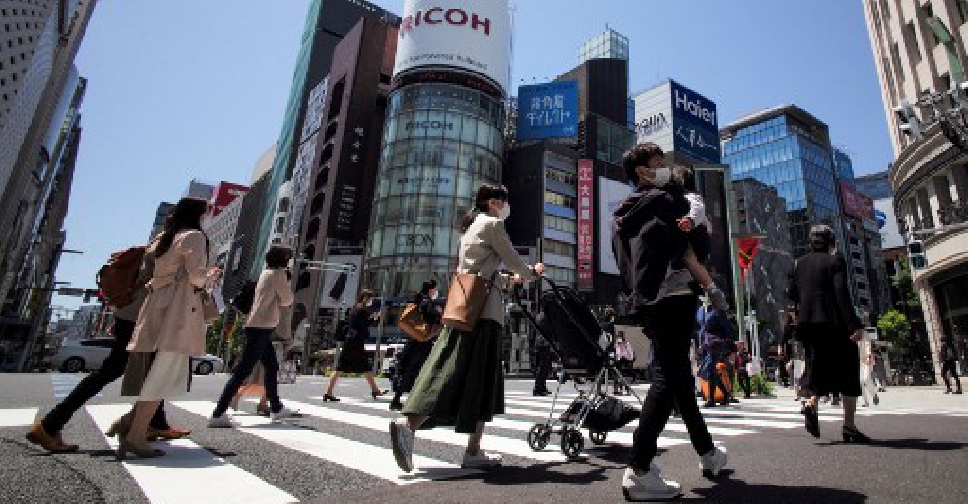
Japan's government is set to extend on Friday a state of emergency in Tokyo and three other areas until the end of May to curb a surge in novel coronavirus cases, just months before the start of the Tokyo Olympics.
The government had hoped a "short and powerful" state of emergency would contain a fourth wave of infection, but new cases in Tokyo and Osaka prefecture are still at high levels, said economy minister Yasutoshi Nishimura, who is also in charge of pandemic measures.
Extending the state of emergency to May 31 from May 11 will leave a margin of fewer than two months before the July 23 start of the Games, which were postponed a year due to the pandemic.
"Osaka particularly is in quite a dangerous situation with its medical system," Nishimura said on Friday at the start of a meeting with a panel of medical and economic experts, noting that variant strains are spreading rapidly.
"We have a strong sense of danger that Tokyo could soon be turning into the same situation as Osaka."
The panel later approved the extension plan, Nishimura said. Formal government approval is set for later in the day, with Prime Minister Yoshihide Suga giving a news conference at 7 p.m. (1000 GMT).
All hospital beds for critical patients in Osaka prefecture are occupied, public broadcaster NHK reported on Friday, and Nishimura said the medical situation in neighbouring Hyogo prefecture, where the city of Kobe is located, was also poor.
In Tokyo, there were 907 new cases of novel coronavirus infection on Friday.
Nationwide, Japan has recorded 618,197 cases of infection and about 10,585 deaths from COVID-19, the respiratory disease the virus causes, government figures showed.
EXTENDED MEASURES
Nishimura said the government aims to place Aichi prefecture, in central Japan, and Fukuoka prefecture in the southwest under a state of emergency - joining Tokyo plus Osaka, Hyogo and Kyoto prefectures, home to nearly a quarter of the population, and where current measures began on April 25.
The northern island of Hokkaido and two other areas will be added to regions under a "quasi state of emergency," he added.
Under the extended state of emergency, bars, restaurants, karaoke parlours and other places serving alcohol will continue to be asked to stop offering alcoholic drinks, while people will continue to be asked to avoid taking unnecessary trips.
But other requests will be loosened, Nishimura said. Commercial facilities such as shopping malls, for instance, will be asked to shorten opening hours rather than close completely - though he noted that Tokyo and Osaka prefecture would make their own decisions based on local conditions.
Tokyo Governor Yuriko Koike told a news conference details of Tokyo's measures would come later on Friday.
TORCH RELAY
Japan has not suffered as badly from the virus as other nations, but its vaccination campaign is significantly lagging, with even many elderly people still awaiting inoculation.
Still, Japan and the International Olympic Committee insist the Games will take place, though foreign spectators have been banned. A decision on domestic spectators has yet to be reached.
Upcoming test events for the Olympics, including an athletics event at the weekend, will not be affected by the extension of the state of emergency. The diving World Cup, which featured more than 200 athletes from 50 countries, was held in Tokyo this past week under the current state of emergency.
Still, in Fukuoka, the prefectural governor said it could be "difficult" to host the Olympic torch relay under a state of emergency, Jiji news agency reported on Thursday. The relay is set to take place in the prefecture on May 11 and 12.
Hyogo prefecture is likely keep the relay off public roads when its turn comes later this month, Kyodo news agency reported.

 UK inquiry finds 'chilling' cover-up of infected blood scandal
UK inquiry finds 'chilling' cover-up of infected blood scandal
 Iranian President Raisi killed in helicopter accident, state media says
Iranian President Raisi killed in helicopter accident, state media says
 ICC prosecutor seeks arrest warrants for Israeli, Hamas leaders
ICC prosecutor seeks arrest warrants for Israeli, Hamas leaders
 Assange given permission to appeal against US extradition
Assange given permission to appeal against US extradition
 Israel intends to broaden Rafah sweep, Defence Minister tells US
Israel intends to broaden Rafah sweep, Defence Minister tells US




